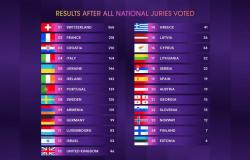The US decision not to veto a UN Security Council resolution calling for an immediate ceasefire in Gaza – the first time since the start of the war, allowing such a resolution to pass – has sent shock waves through Israel.
Benjamin Netanyahu’s subsequent cancellation of his planned meeting with the Biden administration in Washington only amplified the impression that Israel was isolated in the international arena and that the prime minister had jeopardized the country’s most important asset. country: its alliance with the United States.
NEVERTHELESS, although there is widespread criticism of the way in which Netanyahu handled such a delicate issue, even his opponents – both from the “liberal” camp and from the moderate right – unanimously rejected the UN vote. Yair Lapid, leader of the opposition Yesh Atid party, said the resolution was “dangerous, unfair and Israel will not accept it.”
Minister Hili Tropper, a close ally of Netanyahu’s rival Benny Gantz – who according to polls would win effortlessly if the elections were held today – said: “The war must not end.” Such comments were little different from the furious reactions of far-right leaders such as Bezalel Smotrich and Itamar Ben Gvir.
The near-unanimous rejection of the ceasefire reflects cross-party support for the invasion of the southern Gaza city of Rafah, although Netanyahu does not say the operation will deliver the long-awaited “total victory” he promised.
Opposition to a ceasefire might seem strange. Many Israelis share the opinion that Netanyahu continues the war for political and personal interests. The families of the Israeli hostages, for example, are increasingly critical of the way Netanyahu is dragging out the conflict and are amplifying the demand for an “immediate agreement”. Even within the Israeli security system, more and more people are openly saying that “eliminating Hamas” is not an achievable goal.
“To say that one day there will be complete victory in Gaza is a lie,” the former Israeli army spokesman said recently. Israel cannot completely eliminate Hamas in an operation lasting a few months.”
So, if the idea that Netanyahu continues the war for personal reasons is growing; if the futility of continuing it is increasingly clear, both with regard to the defeat of Hamas and the release of the hostages; If it is becoming obvious that continuing the war will damage relations with the United States, how can one explain the consensus in Israel regarding the “danger” of the ceasefire?
One explanation is the trauma inflicted by the October 7 Hamas massacre. Many Israelis tell themselves that as long as Hamas exists and enjoys popular support, there will be no alternative to war.
A SECOND explanation is linked to the undeniable rhetorical talent of Netanyahu who, despite his political weakness, managed to instill the idea of a “total victory” even among those who do not believe a word of what the prime minister says and among those who understand, more or less consciously, that that victory is not possible.
But there is also another explanation. Until October 6, Jewish-Israeli public opinion was in agreement that the “Palestinian question” should not be a source of concern. October 7th shattered this myth. The Palestinian question is back on the agenda with full and bloody force.
There were two possible responses to the destruction of that status quo: a political agreement that truly recognized the presence of another people on this earth and their right to a life of dignity and freedom; or a war of extinction against the enemy beyond the wall. Jewish public opinion, which never truly internalized the first option, chose the second. In light of this, the very idea of a ceasefire appears to be a threat.
It would force the public to recognize that the goals presented by Netanyahu and the army – to overthrow Hamas and release the hostages through military pressure – are simply unrealistic. After the trauma and humiliation of October 7, it is difficult for many to digest.
But there is a deeper threat. A ceasefire could force the Jewish public to confront much more important issues. If the status quo does not work and constant warfare with the Palestinians never leads to the desired victory, all that remains is the truth: that the only way for Jews to live in safety is through a political compromise that respects Palestinian rights.
THE REJECTION complete ceasefire and portray it as a threat to Israel show that we are far from admitting this truth. But strangely, we may be closer than we think. In 1992, when the Israelis were forced to choose between a break with the United States – due to then Prime Minister Shamir’s refusal to accept the American framework for negotiations with the Palestinians – and mending that rift, they chose the second option. Rabin was elected prime minister and a year later the Oslo Accords were signed.
Will the current disagreement with the US administration convince Israeli Jews to abandon the idea of perpetual war and give political agreement with the Palestinians a chance? It’s not clear at all. What is certain is that Israel is rapidly reaching a crossroads and will have to choose where to go: towards a ceasefire and the possibility of dialogue with the Palestinians, or towards an endless war and an international isolation that it has never known. Because the option of going back, to the status quo of October 6, is clearly impossible.
Originally published on +972 in collaboration with The Nation






